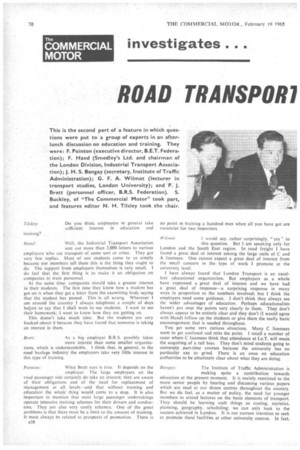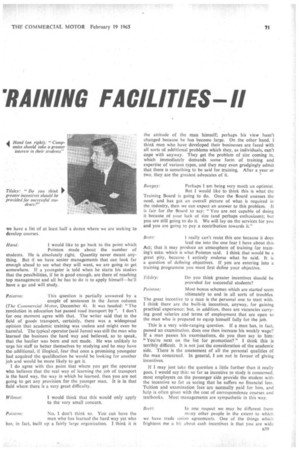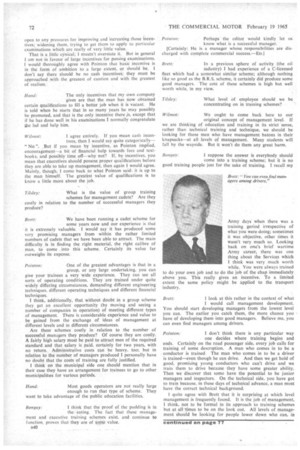ROAD TRANSPOR1 'RAINING FACILITIES II
Page 72

Page 73

Page 74

Page 79

If you've noticed an error in this article please click here to report it so we can fix it.
Tilsley: Do you think employers in general take no point m training a hundred men when all you have got are
sufficient interest in education and vacancies for two inspectors.
Hand: Well. the Industrial Transport Association sent out more than 2,000 letters to various employers who use transport of some sort or other. They got very few replies. Most of our students come to us simply because our members tell them this is the thing they ought to do. The support from employers themselves is very small. I do feel that the first thing is to make it an obligation on companies to train personnel.
At the same time, companies should take a greater interest in their students. The first time they know how a student has got on is when they get a letter from the examining body saying that the student has passed. This is all wrong. Wherever I am around the country I always telephone a couple of days bekore to say that I shall want to see' students. I want to see their homework;! want to know how they are getting on.
This doesn't take much time. But the students are very bucked about it because they have found that someone is taking an interest in them.
Brett: As a big employer B.R.S. possibly takes
more interest than some smaller organizations, which is understandable. I think that, in general, in the road haulage industry the employers take very little interest in this type of training.
Pointon: What Brett says is true. It depends on the
employer. The large employers on the road passenger side certainly do take an interest; they are aware of their obligations and of the need for replacement of management at all levels—and that without training and education the whole thing would come to a stop. It is also important to mention that most large passenger undertakings operate intensive training schemes for their drivers and conductors. They are also very costly schemes. One of the great problems is that there must be a limit to the amount of training. It must always be related to prospects of promotion. There is it38
Wilmot • I would say, rather surprisingly. "yes" to
this question. But I am speaking only for London and the South East region. In road freight I have found a great deal of interest among the large units of C and A licensees. One cannot expect a great deal of interest from the small concern in the type of work I promote at the university level.
I have always found that London Transport is an excellent educational organization. But employers as a whole have expressed a great deal of interest and we have had a great deal of response—a surprising response in many ways in proportion to the numbers involved; but I think the employers need some guidance. I don't think they always see he wider advantages of education. Perhaps educationalists haven't put over the points very clearly to them. They don't always appear to he entirely clear and they don't (I would agree with Hand) follow up the students or give them the really basic encouragement that is needed throughout.
You get some very curious situations. Many C licensees seem to get confused and miss the point. I recall a number of cases where C licensees think that attendance at I.o.T. will mein the acquiring of a rail bias. They don't mind students going to university • part-time courses because the university has no particular axe to grind. There is an onus on education authorities to be absolutely clear about what they are doing.
Basigay: The Institute of Traffic Administration is making quite a contribution towards education at the present moment. It is mainly restricted to the more senior people by hearing and discussing various papers which are read at our dozen centres throughout the country. But we do feel, as a matter of policy, the need for younger members to attend lectures on the basic elements of transport. They should be learning such things as costing. statistics. planning, geography. scheduling; we can only look to the success achieved in London. It is our current intention to seek to promote these' facilities at other university centres. In fact,
we have a list of at least half a dozen where we are seeking to develop courses.
Hand. I would like to go back to the point which
Pointon made about the number of students. He is absolutely right. Quantity never meant anything. But if we have senior managements that can look far enough ahead to see what they will want, we are going to get somewhere. If a youngster is told when he starts his studies that the possibilities, if he is good enough, are there of reaching top management and all he has to do is to apply himself—he'll have a go and will study.
Painton: This question is partially answered by a couple of sentences in the Janus column (The Commercial Motor, December 4). It was headed: "The revolution in education has passed road transport by ". I don't for one moment agree with that. The writer said that in the field of goods transport, certainly, there was a widespread opinion that academic training was useless and might even be harmful. The typical operator (said Janus) was still the man who learned the business the hard way and believed, so to speak, that the haulier was born and not made. He was unlikely to urge his staff to better themselves by studying and he may have the additional, if illogical, fear that once a promising youngster had acquired the qualification he would be looking for another job and would be more likely to get it.
I do agree with this point that where you get the operator who believes that the real way of learning the job of transport is the hard way, the way in which he learned, then you are not going to get any provision for the younger man. It is in that field where there is a very great difficulty.
Wilmot: I would think that this would only apply to the very small concern.
Pointon: No, I don't think so. You can have the
man who has learned the hard way yet who has, in fact, built up a fairly large organization. I think it is the attitude of the man himself; perhaps his view hasn't changed because he has become large. On the other hand, I think men who have developed their businesses are faced with all sorts of additional problems which they, as individuals, can't cope with anyway. They get the problem of size coming in, which immediately demands some form of training and expertise of various types, and they may even grudgingly admit that there is something to be said for training. After a year or two, they are the greatest advocates of it.
Bangay: Perhaps I am being very much an optimist.
But I would like to think this is what the Training Board is going to do. Once the Board assesses the need, and has got an overall picture of what is required in the industry, then we can expect an answer to this problem. It is fair for the Board to say: "You are not capable of doing it because of your lack of size (and perhaps enthusiasm); but you are still going to do it. We will lay on the services for you and you are going to pay a contribution towards it."
Brett: I really can't resist this one because it does
lead me into the one fear I have about this Act; that it may produce an atmosphere of training for training's sake, which is what Pointon said. I think that would be a great pity, because I entirely endorse what he said. It is a question of defining objectives. If you are entering into a training programme you must first define your objective.
Tilsley: Do you think greater incentives should be
provided for successful students?
Polo/on: Most bonus schemes which are started seem
ultimately to end in all sorts of troubles. The great incentive to a man is the personal one to start with. I think there are the built-in incentives, anyway, for gaining practical experience; but, in addition, there are vacancies carrying good salaries and terms of employment that are open to the man who is prepared to equip himself fully for the job.
This is a very wide-ranging question. If a man has, in fact, passed an examination, does one then increase his weekly wage? If a man passes his examinations, do you then say to him: "You're next on the list for promotion?" I think this is terribly difficult. It is not just the consideration of the academic side. There is the assessment of all the personal qualities of the man concerned. In general, I am not in favour of giving incentives.
If I may just take the question a little further than it really goes, I would say this: so far as incentive to study is concerned, most employers on the passenger side provide the student with the incentive so far as seeing that he suffers no financial loss. Tuition and examination feesare normally paid for him, and help is often given with the cost of correspondence courses and textbooks. Most managements are sympathetic in this way.
Brett: In one respect we may he different trom m.i.ny other people in the extent to which we have trade union agreements. One of the things which frightens me a bit about cash incentives is that you are wide a39 open to any pressures for improving and increasing those incentives; widening them, trying to get them to apply to particular examinations which are really of very little value.
That is a little cynical; I mustn't overstate it. But in general I am not in favour of large incentives for passing examinations. I would thoroughly agree with Pointon that basic incentive is in the form of ambition to a large extent, or should be. I don't say there should be no cash incentives; they must be approached with the greatest .of caution and with the greatest of realism.
Hand: The only incentives that my own company
gives are that the man has now obtained certain qualifications to fill a better job when it is vacant. He is told when he starts that in so many years he may possibly be promoted, and that is the only incentive there is, except that if he has done well in his examinations I normally congratulate t,he lad and help him. •
Wilmot: I agree entirely. If you mean cash incen
tives, then I would say quite categorically" No ". .But if you mean by incentive, as Pointon implied, encouragement--a bit of financial help towards fees and textbooks, and possibly time off--why not? If, by incentives, you mean that executives should possess proper qualifications before they are able to take up management, then again I would agree. Mainly, though, I come back to what Pointon said: it is up to the man himself. The greatest value of qualifications is to know a little more about the job.
Tilsley: What is the value of group training
schemes for management cadets? Are they costly in relation to the number of successful managers they produce?
Brett: We have been running a cadet scheme for
some years now and our experience is that it is extremely valuable. I would say it has produced some very promising managers from within the rather limited numbers of cadets that we have been able to attract. The main difficulty is in finding the right material, the right calibre of man, to come into this scheme. Certainly its value far outweighs its expense.
Pointon: One of the greatest advantages is that in a group, or any large undertaking, you can give your trainees a very wide experience. They can see all sorts of operating conditions. They are trained under quite widely differing circumstances, demanding different engineering techniques. different operating techniques and different financial techniques.
I think, additionally, that without doubt in a group scheme they get an excellent opportunity (by moving and seeing a number of companies in operation) of meeting different types of management. There is considerable experience and value to be gained from the exchange of ideas of management at different levels and in different circumstances.
Are these schemes costly in relation to the number of successful managers they produce? Of course they are costly. A fairly high salary must be paid to attract men of the required standard and that salary is paid, certainly for two years, with no return. Administrative costs can be heavy, too; but in relation to the number of managers produced I personally have no doubt that the costs of training are fully justified.
I think on the municipal side one should mention that in their case they have an arrangement for trainees to go to other municipalities for various periods.
Hand: Most goods operators are not really large
enough to run that type of scheme. They want to take advantage of the public education facilities.
Bangay: I think that the proof of the pudding is in
the .eating. The fact that these management and executive training schemes exist, and continue to function, proves that-they are of soMe value.
B40
Pointon: Perhaps the editor would kindly let us.
know what is a successful manager. [Certainly: He is a manager whose responsibilities are discharged with complete commercial success.—Ea]
Brett: In a previous sphere of activity (the oil
industry) I had experience of a C-licensed fleet which had a somewhat similar scheme; although nothing like so good as the B.R.S. scheme, it certainly did produce some good managers. The cost of these schemes is high but well worth while, in my view.
Ti/sic)': What level of employee should we be ,
concentrating on in training schemes?
Wilmot: We ought to come back here to our
original concept of management level. If we .are thinking of education and training in its strict sense, rather than technical training and technique, we should be looking for those men who have management batons in their knapsacks—at all levels of management. Many students will fall by the wayside. But it won't do them any great harm.
Bangay: 1 suppose the answer is everybody should
come into a training scheme; but it is no good training people just for the sake of training. I recall my
Army days when there was a training Reriod irrespective of what you were doing; sometimes it was objective, other times it wasn't very much so. Looking back on one's brief wartime Army career, there was one thing about the Services which I think was very much worth while. You were always trained to do your own job and to. do the job of the chap immediately above you. This really gives an incentive. To a limited extent the same policy might be applied to the transport industry.
Brett: I look at this rather in the context of what
I would call management development. You should start developing managers from the lowest level you can. The earlier you catch them, the more chance you have of developing them into good managers. Believe me, you can even find managers among drivers.
Pointon: I don't think there is any particular way one decides where training begins and ends. Certainly on the road passenger side, every job calls for training of some description. A man who comes in to be a conductor is trained. The man who comes in to be a driver is trained—even though he can drive. And then we get hold of good, promising young conductors who can't drive and we train them to drive because they have some greater ability. Then we discover that some have the potential to be junior managers and inspectors. On the technical side, you have got to train because. in these days of technical advance, a man must have the correct technical background.
I quite agree with Brett that it is surprising at which level management is frequently found. it is the job of management, I think, not to be formal in its approach to training schemes but at all times to be on the look out. All levels of .management should be looking for people lower down who can, in
act, be earmarked for future promotion. Then some form of raining must be given, even though it is only individual tuition s distinct from a man doing a formal training scheme.
ndustry?
'ointon: I think there is, perhaps, a little more that
the industry could do to train people up to nspector level. I think it is sometimes overlooked that a man toesn't always stay an inspector; that from the inspector we may ultimately get, say, an area superintendent or a manager. You an'tjust insist on a man having academic training. You can't ay a man must do the R.S.A. course before he becomes an 3spector. What I do say is that with the right personal ,ualittes a man is better at his job and has a better prospect if iven a wider education and some form of training.
Increasingly in the past few years there has• been a much reater appreciation of the need for junior management trainlg. By that I meats getting hold of the youngster coming from chool, between 16 and 18. Not all the best people go to niversity. and not all the best people carry on at school until ney are 18. You can find good people between 16 and 18 who ave a real ability, a love of the job and a desire to make a areer. With transport courses and general business studies, ley are well equipped for important management roles.
rand: I would think that you have got to start
looking for management from the time you tke ybung lads on. Some will fall by the wayside and get as is as junior management. But by then you have a very good ssessment of who is going to make the grade and you carry n with their training. It gradually falls into a pattern.
I think we are all agreed that the aim of education and training. as we have defined . is junior management. I did not wish to imply by my riginal remarks that this should be taken at a certain grade. If course. Brett is right in saying that someone from a lower rade can have management material about him, and I think us is very important. But it is a question of selection at all rades—even the lowest grade. I would like to refer to ointon's remark that the best people don't always go to the niversities. I entirely agree. I think there is a confusion in tought here. which has not been helped by the Robins ommittee on Higher Education, who imply everyone who as two advance-level subjects should by right go to university. This is nonsense. There are many able people who don't wish • go to this rather specialized, secluded life of study to take a :gree. I don't think we should give the impression that the -aduate is some mighty person. He tends to be better anagement potential; but it is only a tendency, and I think tat to omit from the management level those who haven't :en to university would be very bad.
Now talks have begun on setting up a Road Transport Training Board, would xi give your opinion of possible future changes that ight occur?
reti: In what context are you thinking of
changes? I am thinking of the sort of ianges that I hope are not going to happen within B.R.S. As ton as the amount of levy is known, the accountants are going get busy and see how much the Board is going to give back. 'hat I think is a rather unfortunate change that may arise out this is that the economic aspect will be given undue iportance. which may work to the detriment of the intention • the Act.
Employers may tend to look at the economic aspect arising rim the Act and levy, without giving really adequate regard t the advantages of improving their training. It will be very unfortunate if that does happen, and I can't help feeling that in some spheres it will. The accountants will look at the cost and the economics of training and try to control the activities of their organization on an economic, rather than on a realistic, training basis.
Hand: In road haulage, the majority of the con
cerns are very small businesses, and it means that they will just pay the levy; this will be put on to costs and they will do nothing about it. They won't be in a position to do anything about it. In large fleets they will get some of the money back; but in road haulage itself they will just pay, because there are so many small companies who can't afford training schemes.
Ban gay: Whatever force of good or evil that the new Board is likely to be. it will certainly do one thing. Its first job surely is to inquire into and assess the demands and needs of the road transport industry as a whole. This surely can only be a good thing. Until that inqUiry comes we can't really assess what the Board's proposals will be. I should think it won't have great significance for the larger firm. But I am hopeful that for the smaller firms, and particularly for the personnel of those smaller firms, there may be some possible advantages. It is going to take two or three years before any steps can be taken to implement anything.
Wilmot: I would like to see a much greater degree, imposed by the Board, of day-release. We have suffered too much from the idea of education as being something hole-in-the-corner. I would like to see it very much more full time. I think the Board ought to be prepared to make some compensation. It always amazes me that we spend a sixth of our national income on transport. We spend four times as much on transport as we do on National Health, hospitals, the health service; surely it won't be a tremendous drain on the Exchequer to make some compensation on matters 'of day-release in a matter of this importance.
1 would hope the Board can make some impression on local education authorities to get interested in transport. They don't really know what it is all about. It is time they did. And aFso I hope the Board will put pressure on the universities to train people who can do the teaching.
Brett: I would just like to say that one of the dangers to my organization arising from this point clearly is the number of road hauliers who will not do anything about training whatever, pay their levy and try to pinch the staff whom we have trained. Already there is a tendency to try this.
Pointon: I merely want to express the hope that very
careful consideration will be given to the special circumstances of the passenger side of the industry, and the training already provided, before a decision is taken about setting up a Training Board.
Hand: You can't catch them too early, can you?




































































































































